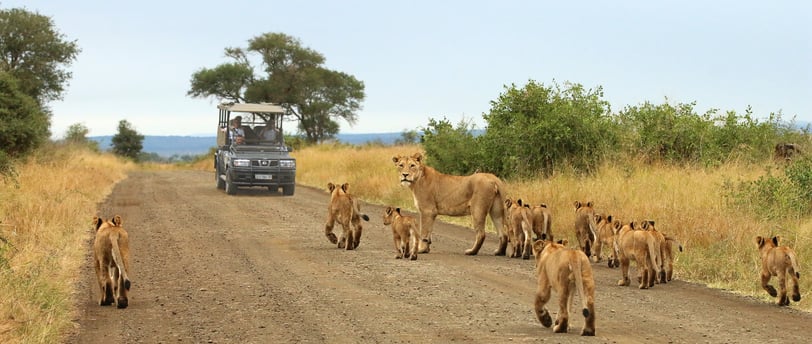Kruger National Park
The quintessential safari destination, South Africa's largest game reserve with nearly 20,000 square kilometres of wildlife.
5/7/20255 min read


South Africa’s Kruger National Park is the quintessential African safari destination. Stunning wildlife, beautiful terrain and a range of accommodations and experiences to suit every type of traveller. Kruger is more than just a park—it’s a living, breathing showcase of African biodiversity. Stretching across nearly 20,000 square kilometres (about the size of Israel or New Jersey), this vast wilderness is one of Africa's largest and most renowned game reserves. Whether you're a first-time visitor or a seasoned safari enthusiast, Kruger National Park promises an unforgettable adventure.
A Wildlife Wonderland: What Animals Can You See?
Kruger is famous for its remarkable density and diversity of wildlife. It is one of the few places on the continent where you have an excellent chance of spotting the Big Five: lion, leopard, rhinoceros, elephant, and Cape buffalo. These iconic species are just the tip of the iceberg, with the park being home to over 150 mammal species, more than 500 bird species, and an incredible variety of reptiles and amphibians.
Each region of the park offers its own unique ecosystem, and the types of animals you may encounter can vary depending on where you are. It has fewer fences to wildlife roams more freely. The southern section tends to have higher game densities, while the central region is renowned for lion and cheetah sightings. The northern part of the park, less visited and more remote, offers spectacular birdwatching and an unspoiled, intimate safari experience.
When to Visit: Timing Your Kruger Safari
Kruger National Park is a year-round destination, but your experience can differ greatly depending on the season.
Dry Season (May to September): This is generally considered the best time to visit. With less vegetation and scarce water, animals gather around waterholes and rivers, making them easier to spot. Temperatures are mild, especially in the mornings and evenings, and there’s little rain.
Wet Season (October to April): This is the lush, green season. While the dense vegetation can make wildlife spotting more challenging, it’s also the time when the park is most beautiful. Migratory birds arrive, new born animals are plentiful, and the scenery is vibrant.
If you're a photographer or birder, the wet season offers incredible opportunities. For first-time safari-goers hoping for easier sightings, the dry season might be the best option.
Safari Activities: What Can You Do in Kruger?
Kruger is not just about game drives. While spotting wildlife is the main draw, the park offers a wide range of experiences that can elevate your safari.
1. Self-Drive Safaris
One of Kruger’s unique advantages is its accessibility. Visitors can rent a car and explore the park at their own pace using well-maintained roads. This option is ideal for those on a budget or seeking a more flexible experience.
2. Guided Game Drives
Most lodges and camps offer morning, afternoon, and evening game drives led by experienced guides. These professionals have expert knowledge of animal behavior and habitats, significantly improving your chances of memorable sightings.
3. Bush Walks
For a deeper connection with the environment, bush walks offer an intimate perspective. Accompanied by armed rangers, guests can track animals on foot, learn about plant life, and gain insights into the complex ecosystems that sustain Kruger. Lodges like the Rhino Post, Klaserie and Ngala Safari are renowned for the bush walk experience.
4. Birdwatching
Kruger is a birding paradise. From the majestic martial eagle to the colorful lilac-breasted roller, the park offers countless birdwatching opportunities, especially during the summer migratory season.
5. Wilderness Trails
For the truly adventurous, multi-day walking safaris through remote parts of the park are available. These immersive experiences are limited to small groups and led by skilled guides and trackers.
Where to Stay: Top Safari Lodges Near Kruger
The type of accommodation you choose can significantly shape your experience. Here’s a breakdown of some of the best safari lodges in and around Kruger National Park:
1. Sabi Sabi Private Game Reserve
Located in the Sabi Sand Reserve, which borders the southwestern part of Kruger, Sabi Sabi is famous for its luxurious lodges and high concentrations of wildlife. Options include Earth Lodge (ultra-modern and eco-friendly), Selati Camp (colonial-style romance), and Bush Lodge (family-friendly luxury).
2. Singita Lebombo and Sweni Lodges
Situated in a private concession on Kruger’s eastern border, Singita’s lodges offer an elite, all-inclusive experience. With sleek, contemporary design and a strong conservation ethos, Singita provides world-class guiding and top-tier cuisine.
3. Lion Sands Game Reserve
Also part of the Sabi Sand area, Lion Sands offers stunning river views and luxury accommodations like Ivory Lodge and River Lodge. The reserve is known for close-up sightings of big cats and exceptional service.
4. Jock Safari Lodge
Located within Kruger itself at the confluence of the Mitomeni and Biyamiti rivers, Jock Safari Lodge combines old-world charm with eco-conscious luxury. It’s a great option for those wanting a premium experience inside the park’s boundaries.
5. MalaMala Game Reserve
One of Africa’s oldest and most prestigious private reserves, MalaMala is known for its consistency in delivering unforgettable wildlife encounters. Its proximity to the Sand River ensures year-round animal activity.
6. Pafuri Camp
In the remote northern sector of the park, Pafuri Camp offers a different experience, with fewer visitors and extraordinary birdlife. The focus here is on nature walks and cultural heritage, making it ideal for seasoned safari-goers seeking something new.
7. Kruger National Park Rest Camps
For budget-conscious travellers, Kruger offers a network of government-run rest camps like Skukuza, Satara, and Lower Sabie. These camps offer basic but comfortable accommodations and the advantage of staying inside the park at a fraction of the cost.
Planning Your Visit: Tips for a Successful Safari
Book Early: Kruger is popular year-round, but during peak seasons (June-August and December), lodges and camps can fill up quickly.
Pack Smart: Neutral-colored clothing, binoculars, sun protection, and a good camera are essential. Mornings can be chilly, so layers are a good idea.
Consider Travel Insurance: A reliable travel insurance policy can be a lifesaver, especially in remote locations. Allianz Travel Insurance offers strong coverage for medical emergencies, trip cancellations, and other unforeseen events—an essential peace of mind for your safari journey.
Health Precautions: Kruger is in a malaria risk area, particularly during the wet season. Consult your doctor about prophylactics and always use mosquito repellent.
Respect the Wildlife: Whether you’re driving yourself or with a guide, always follow park rules. Keep a safe distance from animals, stay in your vehicle unless permitted, and never feed wildlife.
Beyond the Safari: Cultural and Scenic Add-Ons
Your Kruger adventure doesn’t have to end at the park gates. Consider these nearby attractions to round out your trip:
Panorama Route: This scenic drive includes God’s Window, Blyde River Canyon, and Bourke’s Luck Potholes—ideal for breathtaking views and photography.
Shangana Cultural Village: Learn about the traditions and lifestyle of the Shangaan people through performances, village tours, and authentic cuisine.
Lowveld Botanical Gardens in Nelspruit: A peaceful stopover showcasing local flora, waterfalls, and walking trails.
Final Thoughts: Why Kruger Should Be on Your Bucket List
Kruger National Park offers an unrivalled combination of accessibility, biodiversity, and adventure. Whether you're marveling at a lioness stalking her prey at dawn, savoring sundowners by a waterhole, or simply soaking in the vast African skies, Kruger delivers moments of awe and introspection.
Its blend of high-end lodges, budget-friendly rest camps, and a wide range of activities makes it accessible to every kind of traveler. The park's commitment to conservation and sustainable tourism ensures that your visit contributes to the preservation of this incredible ecosystem for generations to come.
So pack your bags, charge your camera, and prepare to be amazed—Kruger National Park is calling, and the wild awaits.
